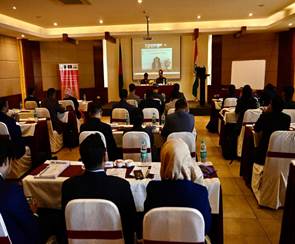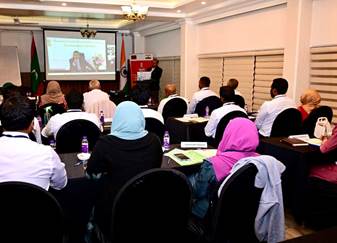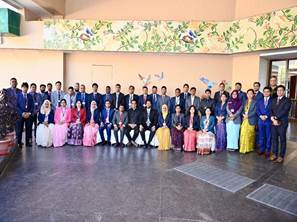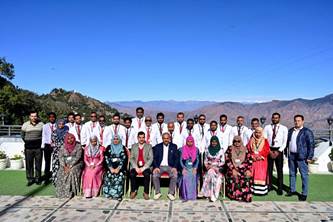Ministry of Personnel, Public Grievances & Pensions
Two-Week Capacity building programmes for civil servants of Maldives and Bangladesh was unveiled at National Centre for Good Governance (NCGG), Mussoorie ; 27 civil servants from Maldives and 39 Civil Servants from Bangladesh are taking part in these two programmes
This programme has been conceptualized in consonance with Prime Minister Shri Narendra Modi’s vision of ‘Vasudhaiva Kutumbakam’ and ‘Neighbourhood First’ policy
Civil Servants must adopt good governance practices to ensure improved quality of life for citizens, says, DG NCGG, Shri Bharat Lal
India is helping neighboring countries to build capacities of their civil servants to meet the emerging challenges in governance and assured public service delivery to improve the quality of life of people
The National Centre for Good Governance has imparted training to civil servants of 15 countries so far
NCGG is expanding its capacity to accommodate higher number of civil servants of more countries as demand is on the rise
Posted On:
13 DEC 2022 1:41PM by PIB Delhi
Two-Week Capacity building programmes for civil servants of Maldives and Bangladesh was unveiled at National Centre for Good Governance (NCGG), Mussoorie. 27 civil servants from Maldives and 39 Civil Servants from Bangladesh are taking part in these two programmes.
This programme has been conceptualized in consonance with Prime Minister Shri Narendra Modi’s vision of ‘Vasudhaiva Kutumbakam’ and ‘Neighbourhood First’ policy, and India is helping neighbouring countries to build capacities of their civil servants to meet the emerging challenges in governance and assured public service delivery to improve the quality of life of people.
This capacity building programme will help the civil servants in putting up dedicated efforts to fill in the gaps between policies and implementation. It is scientifically tailored to equip them to deliver robust and seamless services to the people.


The capacity building programme is in the line with Prime Minister Shri Narendra Modi’s good governance mantra that is ‘pro-people’ by putting ‘citizen first’ at the forefront of the development strategy. The programme aims to promote exchange of information, knowledge, share new ideas and best practices to enhance sensitivity, responsiveness and bring efficiency in civil servants of participating countries.
The joint inaugural session was chaired by Shri Bharat Lal, Director General, National Centre for Good Governance. Addressing the officers, he emphasized on providing effective public service delivery and elaborated on the role of civil servants to create an enabling environment, where every citizen is treated equally and have access to quality public services. He urged them to adopt good governance practices to ensure improved quality of life. The Director General also gave examples of good governance models of India such as the Ujjwala Yojana which has benefited more than 100 million families, who have access to clean cooking gas connections, thus saving them from the drudgery of collecting firewood and inhaling smoke during cooking. As per the WRI report, due to Ujjwala yojana, every year more than 1.5 lakh lives especially women are saved from lungs related complications and mortality.
He also highlighted the Jal Jeevan Mission to ensure clean tap water for every rural household. As per another study by Nobel laureate Prof. Kramer of Chicago University, USA, every year lives of more than 1.36 lakh infants are saved from mortality, thus enabling them to live a full life and contribute to society.
He discussed how civil service is about creating an enabling environment and bringing transformational impact where no individual is left out. He urged the participants to utilize the learning from this programme and develop an action plan or idea, which can be considered for implementation in their country.


During the visit of Prime Minister of India Shri Narendra Modi to Maldives in 2019, National Centre for Good Governance (NCGG), entered into an MoU with the Civil Service Commission, Maldives for capacity building of 1,000 Maldives civil servants by 2024. Similarly, an agreement was signed with the Govt of Bangladesh for the capacity building of 1,800 civil servants by 2024.
The National Centre for Good Governance was set up in 2014 by the Government of India as an apex institution in the country with a mandate to work on good governance, policy reforms, training and capacity building of civil servants of the country as well as of other developing countries. It also works as a think tank. It has taken up capacity building of civil servants of several developing countries in partnership with the Ministry of External Affairs. So far, it has imparted training to civil servants of 15 countries viz. Bangladesh, Kenya, Tanzania, Tunisia, Seychelles, Gambia, Maldives, Sri Lanka, Afghanistan, Laos, Vietnam, Bhutan, Myanmar and Cambodia. These training were found to be highly useful by the participating officers of different countries. These programmes are much sought after and NCGG is expanding its capacity to accommodate higher number of civil servants of more countries as demand is on the rise.
The capacity building programme entails detailed knowledge sharing in the field of public administration, total quality management, gender and development, decentralisation in India, public policy and implementation, leadership & communication, healthcare, water & sanitation, e-governance and digital India among other important areas.
During the programme, the participants will also be taken for exposure visits to see various developmental works and institutions such as smart city, Indira Paryavaran Bhawan: Zero Energy Building, Parliament of India, New Delhi Municipal Council, Pradhanmantri Sanghralaya, etc.
During the inaugural session, Dr. Poonam Singh, Dr. Ashutosh Singh and Dr. Sanjeev Sharma were involved in organizing the programme and spoke on good governance and capacity building programme organized by NCGG.
<><><><>
SNC/RR
(Release ID: 1883025)